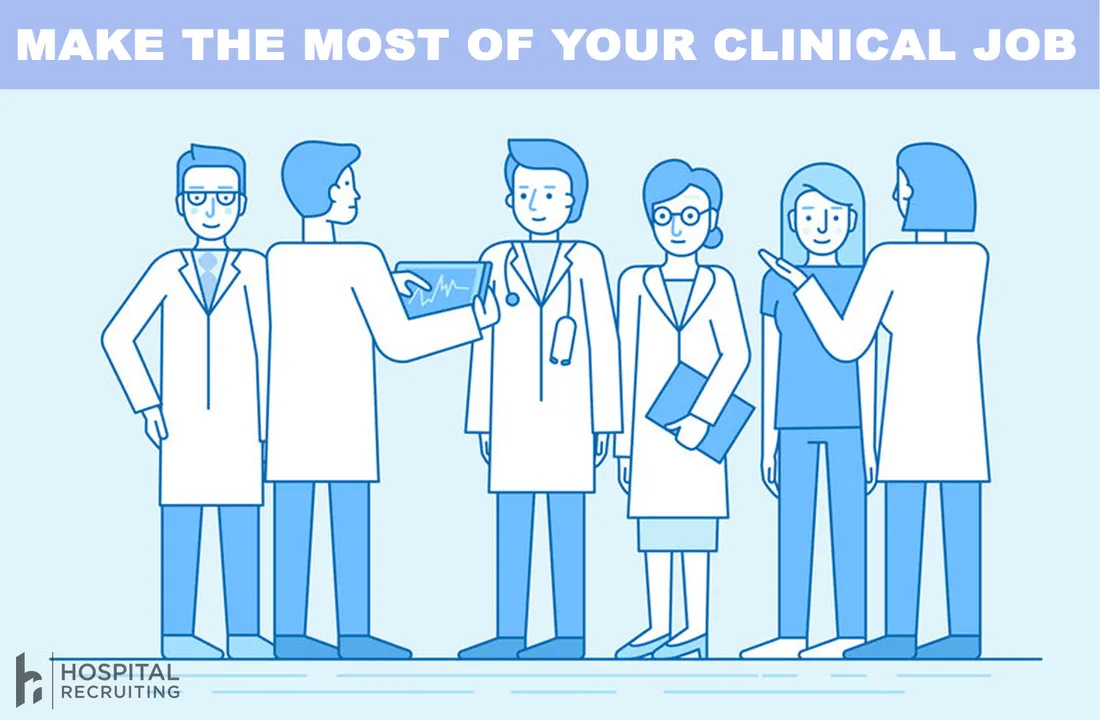How to Make the Most of Your Clinical Physician Job...

...To move into your next one
A lot of the conversation surrounding physician career change presumes you’re moving to a non-clinical role. But many physicians simply want a new job—a new clinical environment with new people and new challenges. Not every physician wants a drastic change. Many physicians simply want a new environment to practice in. Maybe you want to keep certain parts of your job but leave others. Maybe you want the foundation of your work to be clinical, but with the chance to expand into new roles on top of that.
Here are six tips to make the most of your current clinical job to help facilitate a change to a new one.
Gain perspective
There is no job that is all good or all bad (including your current job and the one you’re considering. When we think of a new job, we tend to fall into black and white thinking, perceiving our current job as all bad and the new job as offering salvation. This distortion will set us up for disappointment and delay our satisfaction.
When we consider our current situation, it’s easy to come up with negatives about our current position and positives about a new one. So ask yourself — when you leave your job, what will you miss? Who will you miss? What things would you never change? And regarding a new job, remember that medicine is a fairly small world. It’s easy to find connections with experience at the new organization that can help you gain perspective. People are often willing to show you the problems before you make any decisions.
Seeing the new place through their eyes will help you gain perspective on the change you’re considering.
Define what you like in your current job
Identify the parts of your job that you like and define them as clearly as you’re able. These are the parts you’d like to reproduce in any new job you take. These are the parts that you don’t want to compromise on. These can be clinical aspects (you like the way that consultations are handled) or they can be non-clinical (you really like working with the quality committee.)
Write these out as a list of wants for any new position. Some are things you cannot control (if you really like your EMR and a new facility has a different EMR, you might be stuck), but some are ripe for negotiation. The goal is to clearly define these aspects of your job so that you are clear when you interview and begin crafting a new job description.
Repackage your likes
Once you identify and encapsulate those enjoyable parts of your job, create experiences in them. For example, if you really enjoy a quality improvement and you would like to do more at your next job, seek quality projects and presentations you can put your name on. A CV with your name next to several QI projects speaks volumes compared to one that says “Member of Quality Committee.”
The same likes can be repackaged for clinical experiences as well. The efficiency of your care, your patient satisfaction or the volume of your service are all measurable, definable qualities. These can be placed on a CV to illustrate your interest in clinical medicine as a priority and what resources you will need to achieve them.
Overall, the idea is to take what you like and put it in a clear, definable package. Think of this as the currency of your new job—you need to reproduce what you like and these experiences are the discrete examples of what you’re looking for.
Set goals for what you can control
By taking account of your current position, you will have a sense of what is under your control and what isn’t. You cannot control the type of EMR you have nor the number of consults you receive. You can influence patient satisfaction, committee membership or hospital service.
Once you define this, prioritize those things you can control and set goals for them. For instance, you want to have a performance project completed in three months. Or, you want your patient satisfaction to go up by 5% or your length of stay to go down by 1 day. These are goals that are within your reach; goals you can influence that you will want to point to as you move toward a new clinical position.
Explore local opportunities
Sometimes in our desire to move on, we overlook the opportunities at our fingertips. Ask yourself—is there more I can take from my current organization that I haven’t taken advantage of?
Courses, internal training, certifications, research or internal improvement opportunities. Larger organizations often have programs that need physician involvement. Even taking new assignments or working with a new team within your current position are growth opportunities that can help us move to the next stage in our careers. When we’re dissatisfied with a position, we tend to look at these as tasks without rewards or that we’re doing even more for an organization we dislike. But, if we can change our perspective to view them as opportunities to demonstrate our success or experience, we can use them to support our evolution.
These are chances for us to build a CV without having to leave our current position.
Careers are a continuum
No job will be perfect. Your current job has some positive aspects to it. By gaining perspective on those and encapsulating them, you can define them for future employers and recreate them in your next position.
No one is perfect at their job—we can always improve. There are ways to demonstrate improvement that you can identify and control. Set attainable goals for your current position that you can point to as a measure of your success. Having this goal-direction will put a new perspective on your current position and make it more tolerable as you search for a new role.
It’s easy to overlook the opportunities available to you when you’re seeking a new position. Take a good look at your current position and see if there are opportunities to take advantage of; opportunities you already have access to that will not only help you build equity in your current position but can propel you into a new one.
Careers are a continuum; they’re something you craft. Make the most of your current position in order to maximize your next step.
Related Posts
